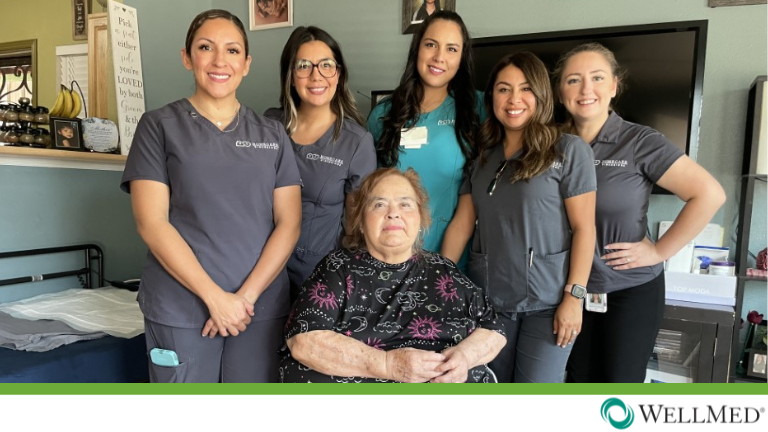Maria Herrera
Home Care Dimensions team helps diabetic patient walk again

“They encouraged me to get better. My foot is now healed and thanks to the nurses who treated me, the doctor discharged me and told me to keep on walking to get my strength back.”
After her discharge from the hospital, where she was treated for a severe leg wound, El Paso patient Maria Herrera was initially afraid to get out of bed, let alone walk to the bathroom or the kitchen. However, a team of health care professionals from Home Care Dimensions helped her see that under their care, she would be able to walk again.
The first challenge was getting Maria’s diabetes under control. Emily Garcia, a licensed vocational nurse, was responsible for Maria’s wound care. She also helped educate Maria about nutrition, advising her to keep track of what she was eating and how it affected her well-being. Emily had Maria write down her blood sugar level and then compare it with what she had eaten the day before. Maria noticed an important pattern: Eating healthier foods made her feel better. This helped her see that she had some control over her physical health.
At first, Maria resisted Emily’s advice to eat better because she preferred her current diet, which consisted of mostly carbohydrates such as rice, potatoes, sweet breads and little or no protein. Maria said, “I had no appetite at all. II was still recovering from COVID and everything tasted bad. I was in the hospital for two weeks and nothing agreed with me.” After she was discharged, she moved in with her daughter, who cooked healthy food for her. Then Maria started to eat more vegetables and protein and less comfort food.
“Sometimes people feel they are being punished when someone tells them, ‘You can’t eat that, you have diabetes.’ You can still eat your favorite foods occasionally, but in smaller portions,” Emily said.
Due to dietary changes, Maria no longer needed diabetes medication to control her blood sugar level. Maria’s wound also began to heal faster as a result.
Emily always encourages her patients to “do their homework,” the exercises assigned by other health care team members. This coordination of care eventually helped Maria get back on her feet.
When Maria first began physical therapy, Diana Ramirez and Elvia Saldivar assisted her. At first, she wasn’t very motivated. She made some progress, but her wound was still healing. She stopped pushing herself during the therapy sessions because she was afraid she couldn’t do it. When Maria’s progress plateaued, they discharged her temporarily to give her wound more time to heal and allow her to become more mentally ready to continue. Diana said, “We did see the desire in her to get better. She was just scared.” They also gave her a copy of her homework exercises so she could continue to do them on her own.
Next, Judy De La Cruz, the occupational therapist assistant, worked with her to strengthen her muscles so that she could sit and stand better. Judy noticed that Maria’s spirits had also improved and she was more light-hearted. She started doing her homework and continued to work with Judy so she could sit and stand. She was also more motivated to resume the physical therapy sessions. Maria’s family continued to provide support by cooking healthy meals and making sure she did her homework.
The occupational and physical therapy gave Maria the confidence to get up, move around and even go to the bathroom by herself instead of using a bedpan. This was an important milestone for her. She eventually regained the ability to sit and stand independently and walk around the house using a walker for support.
About the nurses and therapists who helped her, Maria said, “All of them were very nice to me. They encouraged me to get better. My foot is now healed and thanks to the nurses who treated me, the doctor discharged me and told me to keep on walking to get my strength back.”
Your health is important to us
Interested in learning more about WellMed? We are happy to help. Please contact our Patient Advocate team today.
Call: 1-888-781-WELL (9355)
Email: WebsiteContactUs@wellmed.net
Online: By completing the form to the right and submitting, you consent WellMed to contact you to provide the requested information.
Representatives are available Monday through Friday, 8:00am to 5:00pm CST.
Become a patient
"*" indicates required fields
